IMPORTANCE OF SPICES
The Healing Power of Food and Spices
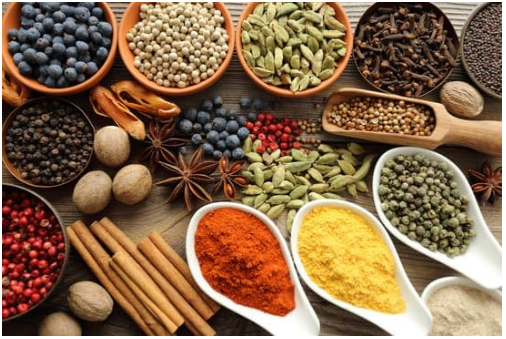
Traditionally, discussions in naturopathy have centered on specific diseases—their causes, symptoms, and natural remedies. However, there’s a growing recognition of the crucial role that daily food plays in health and wellness.
The saying “Food is medicine” reflects the belief that when food is prepared properly, it not only nourishes the body but also serves as a remedy. In Indian cuisine, spices have been integral for centuries. These spices, far more than mere flavor enhancers, offer significant health benefits. They aid digestion, support gut health, and ensure that food is absorbed and utilized effectively.
Ancient Indian texts like the Charaka Samhita have long documented the medicinal properties of these spices. For instance, turmeric, with its active ingredient curcumin, has been recognized for its potential to prevent diseases like cancer—a fact now supported by modern science.
In Indian culture, the use of spices in everyday meals is not just for taste but for health. These spices help make food more digestible and enhance its nutritional value, contributing to overall well-being. The wisdom passed down through generations reminds us that “a clean stomach leads to a disease-free life.”
By continuing to incorporate these valuable spices into daily diets, individuals can maintain better health and harness the healing power of food.
The Vital Role of Rasas and Spices in Maintaining Health
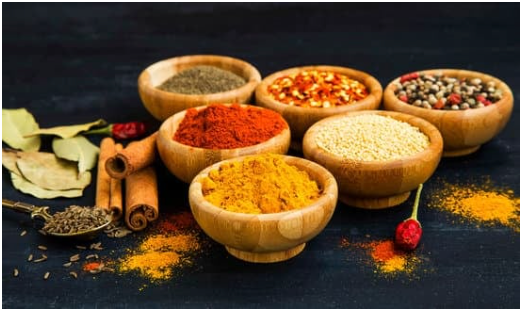
In the holistic approach of naturopathy and Ayurveda, the concept of “Rasas,” or tastes, plays a crucial role in maintaining balance within the body. Just as our body is composed of seven essential tissues or “dhatus,” it also requires a balance of the six primary tastes: sweet, salty, sour, bitter, pungent (spicy), and astringent. Each of these tastes contributes to the overall health and proper functioning of the body’s systems.
The ancient wisdom suggests that a balanced intake of all rasas helps regulate metabolism and digestion, ensuring that the body’s internal systems function harmoniously. For instance, science has shown that an imbalance in electrolytes, such as a high sodium level, can lead to conditions like hypertension. This is why those with high blood pressure are advised to reduce salt intake or switch to alternatives like pink salt or rock salt. The same principle applies to all tastes; an imbalance can disrupt the body’s natural equilibrium, leading to various health issues.
Spices, naturally provided by Mother Nature, are a significant source of these essential tastes. They are not just flavor enhancers but are also vital for our health. For example, in Indian tradition, where food is often seen as a blessing from the goddess Annapurna, spices play a crucial role in making food both delicious and nutritious.
The use of spices varies significantly across different regions of India, tailored to the local climate and geography. In southern India, for instance, coconut and tamarind are commonly used spices, while in western India, green chili, garlic, and ginger are more prevalent. These spices are not just regional preferences; they are essential for maintaining health in those specific environments. This is why it is often recommended to consume seasonal and regional foods, as they are naturally suited to the body’s needs in that particular environment.
Moreover, Indian cuisine is rich in its diversity of spices. From the pepper and salt that are staples across the country to the unique blends used in different states, spices are an integral part of the diet. They enhance the taste of food, stimulate digestion, and offer various health benefits, including improving gut health and boosting immunity.
However, while it is essential to enjoy a variety of tastes, it is equally important to stick to traditional foods, which are time-tested and designed to meet the body’s nutritional needs. While modern cuisines offer new and exciting flavors, they should be enjoyed occasionally rather than becoming a staple. Traditional food, rich in spices and balanced in rasas, provides the best health benefits and ensures the body remains in harmony.
In conclusion, spices are more than just a culinary addition; they are a crucial part of maintaining health and well-being. By incorporating a balanced mix of tastes into our daily diet, we can ensure that our body’s systems function optimally, leading to better overall health. Whether it’s a spicy curry or a simple dish flavored with salt and pepper, the key lies in balance and moderation, tailored to our individual constitution and environment.
Turmeric: The Golden Spice with Remarkable Benefits
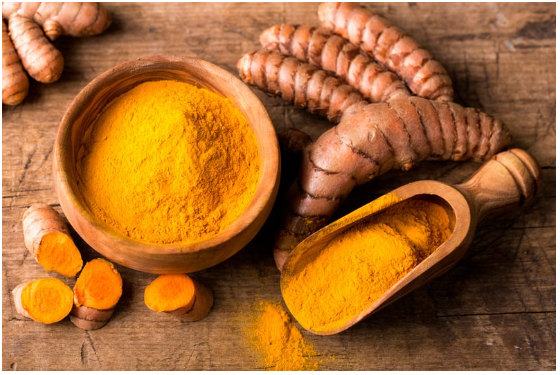
Importance of Turmeric
- Known as the “golden spice,” turmeric is a staple in Indian kitchens and rituals. It’s integral to many traditional ceremonies and is revered for its health benefits.
- Known as the “golden spice,” turmeric is a staple in Indian kitchens and rituals. It’s integral to many traditional ceremonies and is revered for its health benefits.
Antibacterial and Antiseptic Properties
- Turmeric contains curcumin, which provides strong antibacterial and antiseptic properties. This makes it effective in preventing infections and promoting healing.
- Turmeric contains curcumin, which provides strong antibacterial and antiseptic properties. This makes it effective in preventing infections and promoting healing.
Immune System Support
- Turmeric enhances the body’s defense mechanisms. It helps prevent seasonal illnesses like coughs and colds, and is commonly used in home remedies for its immune-boosting effects.
- Turmeric enhances the body’s defense mechanisms. It helps prevent seasonal illnesses like coughs and colds, and is commonly used in home remedies for its immune-boosting effects.
Pain and Inflammation Relief
- The anti-inflammatory properties of turmeric help in reducing pain and inflammation. It’s beneficial for conditions such as arthritis and muscle soreness.
- The anti-inflammatory properties of turmeric help in reducing pain and inflammation. It’s beneficial for conditions such as arthritis and muscle soreness.
Endocrine System Support
- Turmeric can help balance hormones and alleviate symptoms related to hormonal imbalances, such as irregular menstrual cycles and premenopausal symptoms.
- Turmeric can help balance hormones and alleviate symptoms related to hormonal imbalances, such as irregular menstrual cycles and premenopausal symptoms.
Skin Health
- Turmeric is widely used in beauty products for its skin benefits. It can lighten dark spots, reduce scars, and improve overall skin complexion. Traditional uses include turmeric pastes for glowing skin.
- Turmeric is widely used in beauty products for its skin benefits. It can lighten dark spots, reduce scars, and improve overall skin complexion. Traditional uses include turmeric pastes for glowing skin.
Cancer Support
- Curcumin in turmeric has been shown to support cancer patients, especially during chemotherapy. It helps in managing side effects and boosting overall health.
- Curcumin in turmeric has been shown to support cancer patients, especially during chemotherapy. It helps in managing side effects and boosting overall health.
Usage Tips
- Raw Turmeric: Best for those who can access fresh roots. Simply cut and consume.
- Turmeric Powder: Convenient for daily use, easily added to foods and drinks.
Incorporation into Daily Life
- Turmeric is versatile and can be added to various dishes. Regular use in cooking or as a supplement can enhance overall health and well-being.
Black Pepper: The King of Spices
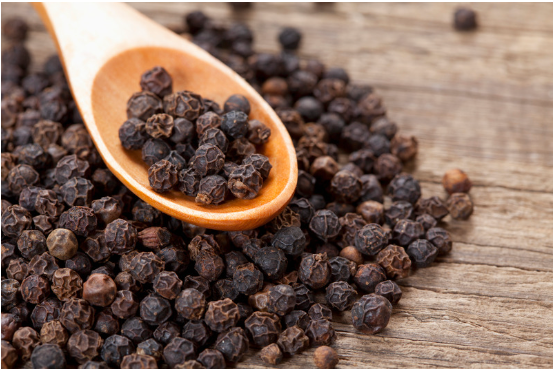
Historical Significance
- Black pepper, often referred to as the “king of spices,” has been highly valued throughout history. Its importance was so significant that it influenced historical events and trade routes.
- Black pepper, often referred to as the “king of spices,” has been highly valued throughout history. Its importance was so significant that it influenced historical events and trade routes.
Detoxification
- Black pepper acts as a detox agent by increasing body heat, which promotes sweating and urination. This helps in the elimination of toxins from the body.
- Black pepper acts as a detox agent by increasing body heat, which promotes sweating and urination. This helps in the elimination of toxins from the body.
Support for Digestive Health
- It aids in digestion by enhancing the digestive fire (agni) and helps break down fatty tissues. Black pepper also improves overall digestive function.
- It aids in digestion by enhancing the digestive fire (agni) and helps break down fatty tissues. Black pepper also improves overall digestive function.
Weight Management
- The phytonutrients in black pepper assist in breaking down fatty tissues, which can aid in weight loss when included in a balanced diet.
- The phytonutrients in black pepper assist in breaking down fatty tissues, which can aid in weight loss when included in a balanced diet.
Regulation of Blood Sugar
- Piperine, the active compound in black pepper, helps regulate blood sugar levels and improve insulin sensitivity, making it beneficial for managing diabetes.
- Piperine, the active compound in black pepper, helps regulate blood sugar levels and improve insulin sensitivity, making it beneficial for managing diabetes.
Skin Health
- Black pepper can help prevent skin damage and wrinkles when used both internally and externally. Ensure the black pepper you use is of high quality to avoid counterfeit products.
- Black pepper can help prevent skin damage and wrinkles when used both internally and externally. Ensure the black pepper you use is of high quality to avoid counterfeit products.
Anti-Cancer Properties
- Rich in antioxidants and vitamins like vitamin C, vitamin A, and carotene, black pepper has anti-cancer properties that may benefit individuals with breast, prostate, or colon cancer.
- Rich in antioxidants and vitamins like vitamin C, vitamin A, and carotene, black pepper has anti-cancer properties that may benefit individuals with breast, prostate, or colon cancer.
Mental Health Benefits
- Black pepper can help alleviate depression and mood swings. Its stimulating effect on the brain can enhance mood and cognitive function.
- Black pepper can help alleviate depression and mood swings. Its stimulating effect on the brain can enhance mood and cognitive function.
Respiratory Health
- Its heaty nature makes black pepper effective in treating cold and cough. It can help relieve symptoms like a runny nose and congestion.
- Its heaty nature makes black pepper effective in treating cold and cough. It can help relieve symptoms like a runny nose and congestion.
Usage Tips
- Daily Consumption: Incorporate black pepper into your diet by adding it to curries, veggies, and salads. Consuming two to three pieces of black pepper daily can offer health benefits.
- Avoid Overuse: Black pepper should be consumed with food to avoid irritation of the stomach lining. It is best used in moderation.
- Forms: Use whole black pepper, freshly ground, or powdered form as per convenience. Green pepper, available in winter, can be preserved for longer use.
By incorporating black pepper into your diet, you can enjoy its diverse health benefits while enhancing the flavor of your meals.
Cardamom (Elaichi): The Spice with Exceptional Health Benefits
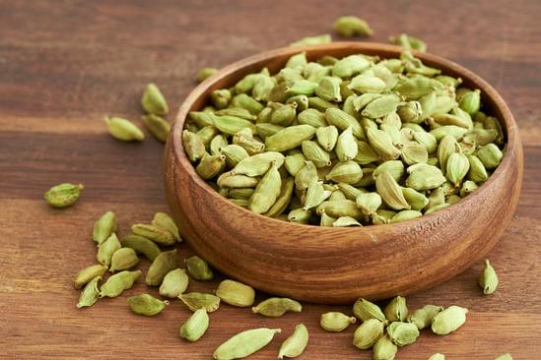
Cardamom, commonly known as Elaichi, is a staple in many households and is widely regarded as one of the most valuable spices in the culinary world. This aromatic spice, available in various types like small, big, green, and black, is not only cherished for its distinct flavor but also for its numerous health benefits. Despite being relatively expensive, its medicinal properties make it a worthy addition to any diet.The Health Benefits of Cardamom are as follows:
1. Natural Antibacterial Properties:
Cardamom is rich in antibacterial properties that help combat bad breath, unpleasant odors, and digestive issues. Many people struggle with bad breath, which can be an embarrassing problem. Whether it’s due to eating onions, smoking, or other reasons, cardamom offers an immediate remedy. Chewing three to four cardamom pods can effectively eliminate bad breath, leaving a fresh, strong aroma in your mouth.
2. Nutrient-Rich Spice:
Cardamom is packed with essential nutrients such as iron, magnesium, sodium, calcium, potassium, and vitamin C. These nutrients contribute to its overall health-boosting properties, making cardamom a powerful spice in promoting wellness.3. Enhances Tea’s Flavor and Reduces Acidity:
In Indian cuisine, cardamom is a key ingredient in tea masala, a blend of spices added to tea. While tea itself contains tannins that may not be ideal for health, adding cardamom helps minimize the acidic reactions caused by tannins. This practice not only enhances the flavor of the tea but also makes it gentler on the stomach. The cardamom used in products like Tulsi Sudha, which also contains cinnamon, ginger, and other herbs, is recommended as a supplement for habitual tea drinkers to reduce tannin effects.4. Aids in Weight Loss:
Cardamom is beneficial for weight management. Its properties help suppress appetite and curb cravings, making it easier to control food intake. Simply chewing two to three cardamom pods can reduce hunger pangs, aiding in weight loss efforts.5. Cancer Prevention:
Cardamom has anti-inflammatory properties that may help reduce the risk of certain cancers. By promoting overall health and reducing inflammation, cardamom plays a role in cancer prevention.6. Pain Relief and Anti-Inflammatory Effects:
Cardamom is often used in traditional remedies to relieve pain and inflammation. It is a common ingredient in kadhas (herbal concoctions), which include cloves, ginger, and other spices known for their natural pain-relieving properties.7. Supports Digestive Health:
Cardamom promotes healthy digestion and is effective in controlling high blood sugar levels. For diabetic patients, chewing two to three cardamom pods daily on an empty stomach can help regulate blood sugar levels, particularly the HbA1c levels, which should ideally remain around 6.5.8. Improves Kidney Health:
Cardamom is rich in antioxidants that support kidney health. It helps detoxify the kidneys by enhancing the function of nephrons, the filtering units of the kidneys.9. Treats Anemia:
Due to its high iron and magnesium content, cardamom is effective in treating anemia. Regular consumption can boost hemoglobin levels, benefiting those with low hemoglobin or anemia.How to Use Cardamom:
Cardamom can be used in various forms—whole seeds, ground powder, or as an essential ingredient in spice blends. Whether added to teas, desserts, or simply chewed as a mouth freshener, incorporating cardamom into your daily routine can significantly enhance your overall health and well-being.The Power of Cinnamon: A Natural Remedy with Multiple Health Benefits
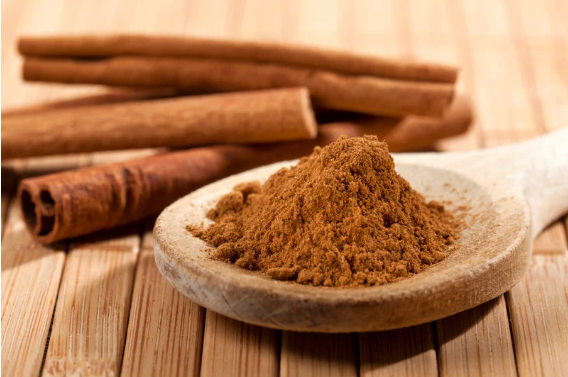
Cinnamon, a staple spice found in kitchens worldwide, is not just a flavor enhancer but also a powerful natural remedy with a wide range of health benefits. Often paired with cardamom in various recipes, cinnamon is derived from the bark of the cinnamon tree, making it a completely organic and natural ingredient. Here’s a closer look at why cinnamon deserves a permanent spot in your pantry.
1. Improves Insulin Sensitivity:
Cinnamon is particularly beneficial for individuals with diabetes due to its ability to improve insulin sensitivity. Insulin, secreted by the pancreas, plays a crucial role in regulating blood sugar levels. By enhancing insulin sensitivity, cinnamon helps maintain balanced blood sugar levels, making it a valuable supplement for those managing diabetes.2. Reduces High Triglyceride and LDL Levels:
One of the standout benefits of cinnamon is its effectiveness in reducing high triglyceride levels. While many medications focus on controlling cholesterol, triglycerides—another form of fat in the blood—are often more challenging to manage. Consuming cinnamon water, especially in the morning, can help lower triglyceride levels over time, providing a natural remedy for those struggling with high triglycerides.3. Fights Against E. Coli Bacteria:
Cinnamon has potent antibacterial properties that help combat harmful bacteria like E. Coli, which can cause severe digestive issues, including diarrhea and stomach cramps. Regular consumption of cinnamon can aid in clearing these bacteria from the digestive tract, promoting better overall gut health.4. Prevents Alzheimer’s and Dementia:
Cinnamon contains compounds that are beneficial for brain health, particularly in preventing neurodegenerative diseases like Alzheimer’s and dementia. By supporting healthy brain cells and maintaining proper neurotransmitter function, cinnamon can play a role in protecting cognitive function as we age.5. Rich in Polyphenol Antioxidants:
Cinnamon is packed with polyphenol antioxidants, which help prevent cell damage and reduce inflammation in the body. These antioxidants are crucial for protecting the body against various forms of cellular damage, which can lead to inflammation, pain, and even the development of cancerous cells.6. Supports Gut Health:
As a natural probiotic, cinnamon promotes healthy digestion and helps maintain gut health. It can alleviate issues like constipation and irregular bowel movements, ensuring that your digestive system functions smoothly.7. Benefits for PCOS and Menstrual Health:
Cinnamon is particularly beneficial for women suffering from Polycystic Ovary Syndrome (PCOS) or irregular menstrual cycles. Consuming a pinch of cinnamon powder mixed with saliva first thing in the morning can help regulate menstrual cycles and alleviate symptoms associated with PCOS.8. Promotes Gum Health:
Cinnamon is also effective in maintaining oral health, particularly in treating gum problems. It can be combined with salt and clove powder to create a natural remedy for bleeding gums, swelling, and other gum-related issues. This mixture can be gently rubbed on the gums to provide relief and promote healthier gums.How to Use Cinnamon:
Cinnamon can be used in various forms, including powder and sticks. The powder is the most common and versatile form, easily added to teas, foods, or even consumed directly for its health benefits. Cinnamon sticks, being in their pure natural form, can be ground into powder or added whole to various dishes and drinks.
Incorporating cinnamon into your daily routine, whether as a spice in your meals or a natural remedy for specific health issues, can have a profound impact on your overall well-being. Its wide-ranging benefits make it a true superfood in the world of natural health remedies.
Cumin seeds (Jeera): The Alkaline Powerhouse of Spices
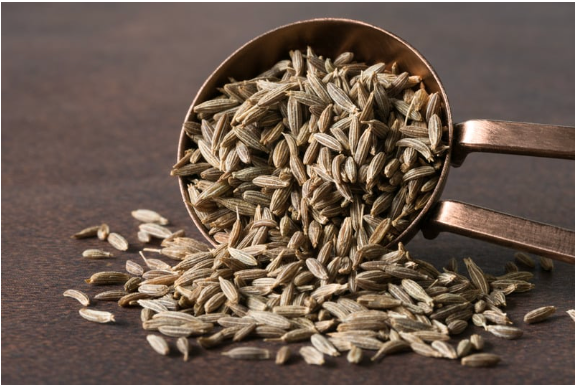
Cumin seeds, or jeera, are indispensable in Indian cuisine, adding flavor and aroma to every dish. From sabjis to dals, no tadka is complete without the earthy notes of whole cumin seeds. But jeera’s importance extends far beyond taste; it’s a powerful, alkaline spice with numerous health benefits.
The Alkaline Nature of Jeera
- Jeera, along with fennel seeds (saunf), is one of the most alkaline spices in the spice kingdom.
- Its cooling properties help maintain balance in the body, counteract acidity, and promote overall wellness.
- Jeera is rich in iron and antioxidants, contributing to its status as a super spice.
Jeera and Lactation: A Traditional Remedy
- For generations, jeera has been used to boost lactation in new mothers.
- Chewing a teaspoon of raw, unroasted jeera in the morning enhances milk production and improves its quality.
- The high iron content and antioxidant properties ensure that the milk is easier for the baby to digest, reducing flatulence and aiding healthy development.
Jeera Tea: A Circulatory System Tonic
- Jeera tea, made by boiling a teaspoon of whole cumin seeds in 100 milliliters of water until reduced by half, is consumed at night to improve blood circulation.
- It’s particularly effective for those suffering from circulatory issues, inflammation, or pain.
- The essential oils in jeera, including vitamins A, E, and C, contribute to its ability to regulate blood sugar levels and support cardiovascular health.
Digestive Health and Anti-Inflammatory Properties
- Jeera is a potent aid for digestion, thanks to compounds like thymol and cuminolate, which halt the growth of harmful microbes, reduce inflammation, and treat flatulence and indigestion.
- Regular consumption of jeera, whether in whole form or as roasted cumin powder, can prevent and alleviate a variety of digestive issues.
Jeera for Degenerative Conditions
- Jeera’s anti-inflammatory properties benefit individuals suffering from degenerative conditions like arthritis or osteoporosis.
- The thymol in jeera helps reduce pain and inflammation, while its circulatory benefits support joint health.
- Drinking jeera tea regularly can provide relief from the symptoms of these conditions, improving quality of life.
The Role of Jeera in Indian Masalas
- Jeera is a key ingredient in various Indian masalas, commonly paired with coriander seeds to form the base of many traditional recipes.
- When balanced correctly, these spices enhance both the taste and health benefits of the dishes they’re used in.
- While commercially prepared masalas are convenient, homemade versions using natural and organic ingredients like jeera offer the same flavor with added health benefits.
Unlocking the Secret of Restaurant-Quality Masalas at Home
- The belief that restaurant food has unmatched flavor often stems from the proper use and balance of spices like jeera.
- With the right knowledge and experience, anyone can replicate restaurant flavors at home.
- Understanding the role of spices in cooking and using them in the right proportions can transform home-cooked meals into culinary masterpieces.
Fennel Seeds (Sauf): The Alkaline Herb with Abundant Health Benefits
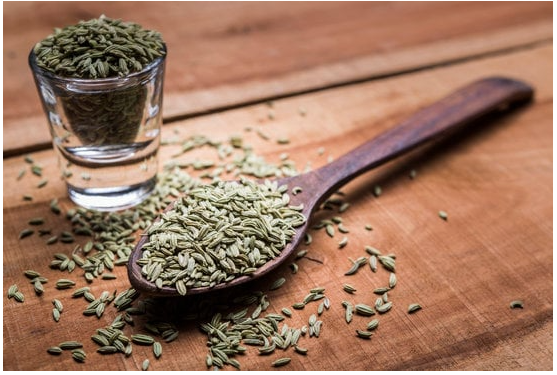
Alkaline Nature and Digestive Relief
- Sauf, along with jeera, is one of the highest alkaline herbs.
- It is especially beneficial for gas, acidity, and diabetic neuropathy.
- Sauf’s alkaline properties make it a powerful remedy for burning sensations and digestive issues.
Nutrient-Rich Profile
- Sauf is rich in fiber, calcium, magnesium, and vitamin C.
- Vitamin C boosts immunity, fiber aids digestion and relieves constipation, calcium supports bone and teeth health, and magnesium is good for bone and muscle health.
Traditional Use After Meals
- Sauf is traditionally used as a component of mukhwas (mouth freshener) after meals.
- This isn’t just for taste; the health benefits of sauf, including aiding digestion, are well recognized in traditional practices.
Digestive Juices and Enzyme Secretion
- Sauf contains volatile oils like anethole, which trigger the secretion of digestive juices and enzymes.
- Proper digestion and absorption of food are enhanced by these secretions, preventing issues like constipation.
Natural Laxative and Gut Health
- Sauf acts as a natural laxative, which helps in treating conditions like IBS, stomach cramps, and constipation without causing diarrhea.
- It cleanses the intestinal canal, supporting overall gut health.
Respiratory Health Benefits
- The essential oils in sauf also help treat respiratory ailments like cough, bronchitis, and nasal congestion.
- These oils support lung health and improve respiratory function.
Menopause and Hormonal Balance
- Sauf helps reduce hot flashes during menopause, providing relief from discomfort and sweating.
- Its alkaline nature supports hormonal balance, particularly during menopause when hormonal fluctuations are common.
Vision and Eye Health
- Sauf is a good source of vitamin A, promoting healthy vision and supporting eye health.
- It is often used in Ayurvedic medicines to reduce eye strain, improve eyesight, and address issues like dry eyes and blurry vision.
Optimal Usage for Health Benefits
- For maximum health benefits, consume sauf in its raw form rather than roasted, as roasting can oxidize some nutrients.
- Green sauf, rich in iron and vitamin E, is particularly beneficial and is commonly enjoyed in many regions.
Nostalgic Childhood Memories
- Green sauf has been a part of childhood memories for many, often purchased from vendors outside schools.
- This habit of chewing green sauf is not only nostalgic but also offers a rich source of essential nutrients.
Sauf is a simple yet powerful herb that can be incorporated into daily life to enhance overall health, from digestion to respiratory and eye health. Understanding its benefits allows for more informed and effective use.
Fenugreek Seeds (Methi Dana): A Powerful Herb for Various Health Benefits
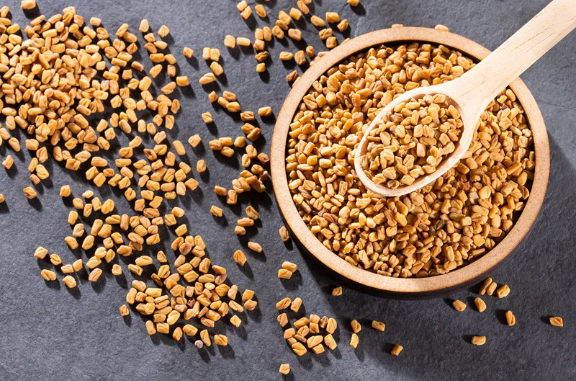
Blood Sugar Regulation
- Methi dana is high in glucomannan and fiber, which help control high blood sugar levels.
- It aids in regulating blood sugar by enhancing insulin secretion from the pancreas.
Weight Management
- Fenugreek seeds, when soaked overnight, expand and absorb water, providing a feeling of fullness.
- Consuming soaked methi dana in the morning can help control appetite and support weight loss.
Cholesterol Reduction
- Methi dana helps lower high cholesterol levels by absorbing and cleansing bad cholesterol (LDL) from the blood.
- It supports a healthy balance of HDL and total cholesterol.
Immunity Boost
- Fenugreek seeds improve immunity and are beneficial during seasonal changes for issues like cough, cold, and chest congestion.
- A tea made from soaked methi dana, with added ginger and pepper, can provide relief from nasal congestion and ease breathing.
Lactation Support
- Methi dana is traditionally used to improve milk production in lactating mothers.
- It enhances digestion and is commonly included in traditional foods like methi ka ladoo for new mothers.
Hair Health
- Fenugreek seeds support hair health by stopping hair loss and promoting hair growth.
- Methi dana is often used in homemade hair oils to address hair fall and improve overall hair condition.
Pain and Inflammation Relief
- Methi dana has natural steroid-like properties that help reduce inflammation and pain, making it useful for conditions like arthritis and joint pain.
- Soaking methi dana overnight and consuming it in the morning can provide relief from inflammatory conditions.
Digestive Health
- Fenugreek seeds help balance vat dosha, reducing gas and bloating.
- They are beneficial for digestive issues related to vat dosha imbalance.
Traditional Use and Preparation
- Methi dana has been a staple in traditional cooking, often used in tadka (tempering) for curries and dals.
- Consuming methi dana in its raw or soaked form is preferred to maximize health benefits.
Versatility in Use
- Methi dana can be used in various forms: whole seeds, powder, or soaked seeds.
- It is a versatile herb that can be incorporated into daily routines for managing various health concerns.
Methi dana is a versatile and powerful herb with a range of health benefits, from managing blood sugar and cholesterol to supporting hair health and reducing inflammation. Understanding its uses and incorporating it into your diet can enhance overall well-being.
Carom Seeds(Ajwain): A Versatile Herb for Health and Digestion
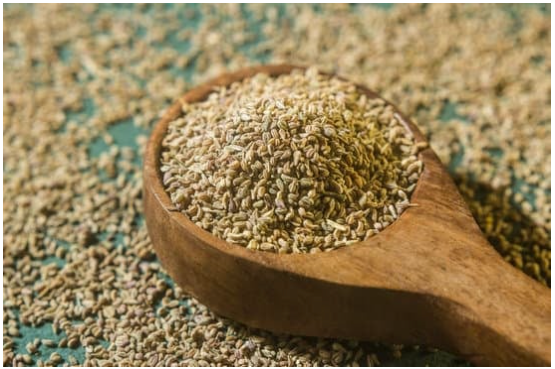
Digestive Health
- Ajwain, though pungent and bitter, is excellent for digestion.
- It contains dietary fibers, essential fatty acids, and protein that support digestive function.
- It helps treat various digestive issues such as acidity, indigestion, and gas.
Hypertension Management
- Ajwain is traditionally used in medicine to control blood pressure.
- It is included in some Ayurvedic remedies for hypertension.
Respiratory Health
- Ajwain is beneficial for respiratory conditions like asthma and bronchitis.
- Combining ajwain with jaggery and consuming it can help alleviate symptoms of asthma and bronchitis.
- This remedy helps clear lung passages and enhances respiratory health.
Anti-Aging Benefits
- Ajwain can help minimize signs of aging such as wrinkles and fine lines.
- Regular consumption can support overall skin health.
Weight Loss and Metabolism
- Drinking ajwain water can enhance metabolism and aid in burning excess fat.
- It contributes to weight loss efforts.
Usage Recommendations
- Whole Seeds: Can be chewed directly.
- Powder: Use in cooking or as a spice.
- Ajwain Water: Soak seeds overnight, drink the water in the morning.
Precautions
- Avoid using ajwain if you have hyperacidity, burning sensations, or piles.
- Use ajwain in moderation and according to your body’s needs.
Ajwain offers a range of health benefits from aiding digestion and managing blood pressure to supporting respiratory health and weight loss. It can be used in various forms, including whole seeds, powder, or as ajwain water, to enhance overall well-being.
Saffron (Kesar): The Sunshine Spice with Health Benefits
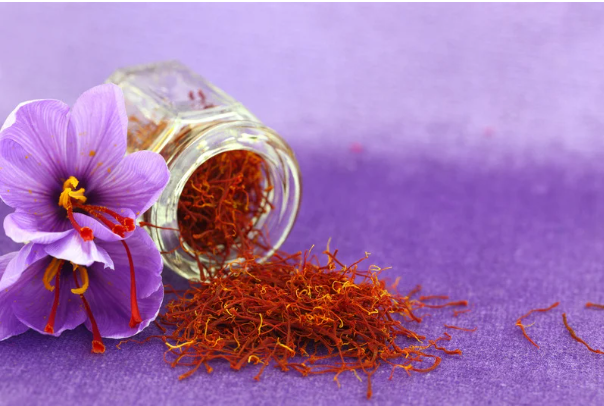
Rare and Precious
- Saffron, often called the sunshine spice, is rare and expensive.
- It grows in small quantities and is harvested from delicate purple flowers, primarily in Kashmir.
Traditional Uses
- Used in Ayurvedic medicines and various sweets like kheer, basundi, and srikhand.
- Enhances the flavor of traditional dishes such as biryani.
Cultural Significance
- Saffron is used in religious rituals, including tikka in temples.
- It is an integral part of cultural practices and beauty treatments.
Health Benefits
- Antioxidant Properties: Reduces inflammation and may help prevent cancer by killing cancer cells and inhibiting their multiplication.
- Mood Enhancement: Smelling saffron helps lower anxiety and boosts mood by stimulating serotonin and oxytocin production.
- Digestive Health: Improves digestion and can alleviate symptoms of PMS by reducing anxiety and stress.
- Skin Health: Supports healthy and radiant skin, prevents sun damage, and reduces sun tanning. Used in beauty products for its anti-aging properties.
- Memory and Cognitive Function: Enhances memory and may aid in the treatment of Alzheimer’s disease.
- Weight Management: Suppresses appetite, aiding in weight loss.
- Heart Health: Maintains heart health and supports overall well-being.
- Seasonal Sicknesses: Helps fight coughs, colds, and other seasonal illnesses.
Usage Recommendations
- Saffron Tea: Boil saffron threads in water to make saffron tea.
- Kadha: Prepare a kadha (herbal concoction) with saffron for its health benefits.
- Culinary Uses: Add saffron to dishes and sweets for flavor and color.
- Beauty Treatments: Use saffron in face masks and skin treatments for radiant skin.
Precautions
- Use saffron in moderation and consult with a healthcare provider for specific health conditions or pregnancy.
Saffron is a versatile spice with a rich history of use in culinary, medicinal, and beauty applications. Its rare nature and powerful health benefits make it a valuable addition to your diet and wellness routine.
Ginger: A Versatile Remedy for Health and Digestion
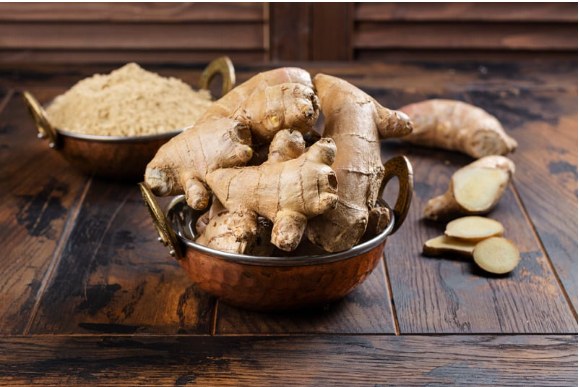
Blood Sugar Management
- Ginger can help manage blood sugar levels. Combine it with hing (asafoetida), ajwain (carom seeds), and pudina (mint) to enhance digestion and treat gastric issues.
- Ginger can help manage blood sugar levels. Combine it with hing (asafoetida), ajwain (carom seeds), and pudina (mint) to enhance digestion and treat gastric issues.
Digestive Health
- Ginger, along with ajwain and pudina, can be used in various forms like juice, kadha (herbal decoction), or powder. This combination helps relieve digestive problems, especially during the rainy season when gastrointestinal issues are common.
- Ginger, along with ajwain and pudina, can be used in various forms like juice, kadha (herbal decoction), or powder. This combination helps relieve digestive problems, especially during the rainy season when gastrointestinal issues are common.
Metabolism and Weight Loss
- Boosts metabolism, which aids in weight loss. High metabolism helps break down fatty tissues, reducing body fat.
- Boosts metabolism, which aids in weight loss. High metabolism helps break down fatty tissues, reducing body fat.
Nutrient Absorption
- Improves nutrient absorption from food, preventing deficiencies in vitamins like B12, B3, A, and E.
- Improves nutrient absorption from food, preventing deficiencies in vitamins like B12, B3, A, and E.
Blood Circulation
- Purifies blood circulation and can be beneficial in managing angina pain. For immediate relief from angina, chewing a small piece of fresh ginger can help sustain the body until medical help is available.
- Purifies blood circulation and can be beneficial in managing angina pain. For immediate relief from angina, chewing a small piece of fresh ginger can help sustain the body until medical help is available.
Immune System Boost
- Ginger lemon tea can improve breath, clear sinuses, and boost immunity. Smelling ginger powder can help prevent viruses and enhance immune response.
- Ginger lemon tea can improve breath, clear sinuses, and boost immunity. Smelling ginger powder can help prevent viruses and enhance immune response.
Cancer Prevention
- Contains compounds like 6-gingerol that may help fight various cancers, including colon, ovarian, breast, lung, prostate, and pancreatic cancers. Ginger is recommended alongside traditional treatments to mitigate the toxic effects of drugs and chemotherapy.
- Contains compounds like 6-gingerol that may help fight various cancers, including colon, ovarian, breast, lung, prostate, and pancreatic cancers. Ginger is recommended alongside traditional treatments to mitigate the toxic effects of drugs and chemotherapy.
Traditional Uses
- Commonly used in traditional tea and remedies for its health benefits and flavor. It is also used to prevent the toxic effects of chemotherapy in cancer treatment.
- Commonly used in traditional tea and remedies for its health benefits and flavor. It is also used to prevent the toxic effects of chemotherapy in cancer treatment.
Usage Tips
- Fresh Ginger: Best for maximum benefits. Chew small pieces or use in teas and recipes.
- Ginger Powder: Can be added to various dishes and drinks for a milder flavor and benefits.
Ginger is a powerful spice with a wide range of health benefits, from digestive relief to cancer prevention. Incorporate it into your daily routine to take advantage of its numerous advantages.
Cloves: A Natural Remedy for Various Ailments
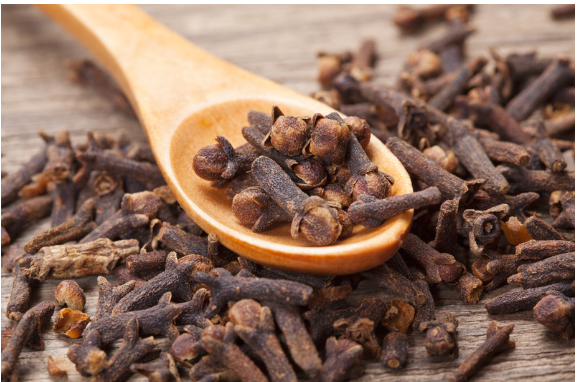
Digestive Health
- Cloves are effective for easing flatulence, gastric irritability, bloating, and nausea. For vomiting sensations, especially during travel, chewing cloves can help alleviate discomfort.
- Cloves are effective for easing flatulence, gastric irritability, bloating, and nausea. For vomiting sensations, especially during travel, chewing cloves can help alleviate discomfort.
Bone and Teeth Health
- Rich in eugenol and manganese, cloves support bone health. Eugenol, found in cloves, is beneficial for maintaining healthy teeth and bones.
- Rich in eugenol and manganese, cloves support bone health. Eugenol, found in cloves, is beneficial for maintaining healthy teeth and bones.
Pain Relief and Anti-Inflammatory Properties
- Eugenol in cloves has strong anti-inflammatory properties, making clove oil an effective remedy for arthritis, general inflammation, and pain relief.
- Eugenol in cloves has strong anti-inflammatory properties, making clove oil an effective remedy for arthritis, general inflammation, and pain relief.
Oral Health
- Clove oil is well-known for its antimicrobial properties, making it effective against toothaches, gum problems, and mouth ulcers.
- Clove oil is well-known for its antimicrobial properties, making it effective against toothaches, gum problems, and mouth ulcers.
Usage Tips
- Whole Cloves: Chew directly for toothache relief or to address vomiting sensations.
- Clove Powder: Can be added to various dishes for both flavor and health benefits.
- Clove Oil: Use for targeted pain relief or oral care.
Incorporating Cloves into Your Diet
- Adding cloves to your regular diet can enhance flavor and offer health benefits. For instance, a pinch of clove powder can be included in pizzas, pastas, and other dishes.
- Adding cloves to your regular diet can enhance flavor and offer health benefits. For instance, a pinch of clove powder can be included in pizzas, pastas, and other dishes.
General Advice
- Integrate cloves and other natural spices into your cooking to benefit from their medicinal properties. Regular use in small amounts can contribute significantly to overall health.
- Integrate cloves and other natural spices into your cooking to benefit from their medicinal properties. Regular use in small amounts can contribute significantly to overall health.
Final Note
- Spices like cloves are not just flavor enhancers but also have valuable health benefits. Using them in daily meals can complement therapeutic treatments and improve overall wellness.
By incorporating these spices thoughtfully into your diet, you can enhance both taste and health benefits, supporting your well-being in a natural and effective way.







